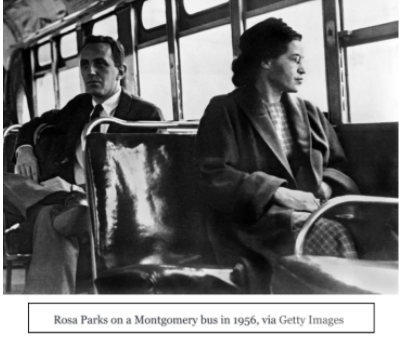In 1955, civil rights activist Rosa Parks was arrested in Montgomery, Alabama for refusing to give up her seat on a bus to a white passenger. This event inspired a much larger civil rights movement by uniting Black Americans across the nation to demand an end to racial segregation.
The beginning of the American civil rights movement is popularly thought to have begun on December 1, 1955 in Montgomery, Alabama when Rosa Parks was arrested for civil disobedience. At the time, Alabama state law required Black passengers to surrender their seat for a white passenger when a bus became full (National Geographic Society 2013). Parks refused the orders to give up her seat to a white passenger and she was then arrested. Within four days of Parks’ arrest, the Black citizens of Montgomery initiated the Montgomery bus boycott that ignited the civil rights movement.
Rosa Parks is idolized in American history to have been a tired, old woman who was unsuspecting of what would happen on the day of her arrest, but this perception does not encompass the full truth about Parks or the civil rights movement.
Professor Brenna Greer of Wellesley college held a lecture in February of 2020 that directly challenged the common misconceptions held about Rosa Parks. Greer discerns that Parks was only forty-two years old at the time of the arrest, and she had already spent more than twenty years advocating on the behalf of Black victims and falsely accused defendants (Greer 2020). Parks was also an active member of influential civil rights organization, the National Association for the Advancement of Colored People (NAACP), and while she was known for demonstrating nonviolent protest, she did not find it to be the only means to demand justice (Greer 2020). The American public has come to idolize Rosa Parks as the pioneer of pacifism, while failing to consider the multidimensional nature of her lifelong civil rights advocacy.
Rosa Parks’ refusal to move in 1955 was not merely coincidental, but a strategic plan with the ultimate goal of desegregation (Greer 2020). In the months prior to Parks’ arrest there were various records of Black women being arrested after refusing orders from a bus driver, however, these previous arrests lacked the exposure and support received by Parks because they were deemed too aggressive, too dark, or too immoral to garner widespread support (Greer 2020). Unlike those arrested before her, Rosa Parks had light skin, and a non threatening demeanor (Greer 2020). Following the arrest on December 1, 1955, the Black community of Montgomery began to mobilize themselves to demand justice and desegregation in response to the ill treatment of Parks. Standing in solidarity with Parks, the Black citizens of Montgomery, guided by Martin Luther King Jr., pledged to boycott the bus system until justice had been served.
During 1955, 75% of bus passengers in Montgomery were Black, which meant that a mass boycott would greatly disrupt the operation of the publicly funded bus system, and reduce economic profit greatly (Greer 2020). And, so it did; for 381 days Black citizens refused public transportation, and, instead, created a network of carpooling (Greer 2020). Although, the bus boycott symbolized more than just the demand for equal access to public transportation. The protest exemplified the strength and unity of the Black community, and the ability to demand and achieve change through widespread mobilized activism.
In November 1956, the United States Supreme Court upheld the decision of the district court to end racial segregation in the Montgomery bus system in the state of Alabama (Greer 2020).
However, this was not the end of the bus boycott; it persisted until December 21, 1956, when desegregation was officially embraced by the bus system (Greer 2020). This victory for the Black community symbolized hope for a more equal future in the United States, and it served as evidence that mobilizing – physically and politically – evokes compelling and widespread support that can result in drastic change.
Martin Luther King Jr. then utilized his support of the masses to conduct protests demanding economic, political, and social mobility for Black Americans. In 1963, King led the March on Washington, in which more than 200,000 protestors demonstrated their further demands for economic and civil rights (The Martin Luther King Dr. Research and Education Institute 2020). King delivered his famous, “I Have A Dream” speech, where he called upon Americans to envision a more united nation (The Martin Luther King Dr. Research and Education Institute 2020). Less than a year later, the Civil Rights Act of 1964 was enacted as law, officially prohibiting racial discrimination in the public sphere and the job markets of the United States – eliciting the explicit demands of the march (The Martin Luther King Dr. Research and Education Institute 2020).
The story of Rosa Parks is one that has been shared globally and become an international symbol for resistance and equality, however, the United States has not been the only nation to revolutionize in response to unjust treatment within public transportation. Just as the Montgomery bus boycott mobilized Americans to demand an end to racial segregation in the 1950s, less commonnly talked about is how Lebanese residents also mobilized to end segregation in the opposite sense of the Montgomery bus boycott. Rather than boycotting the bus system, Lebanese residents began to break segregation standards by utilizing the bus system, for all residents, across cultural lines.
By Margaret Keller-Bennett
Communication Intern ,Riders' Rights
References
Greer, B. (2020, February 28). Rosa Parks and the Montgomery Bus Boycott [Video blog post]. Retrieved from https://www.c-span.org/video/?469440-1/rosa-parks-montgomery-bus-boycott
March on Washington for Jobs and Freedom. (2020, August 04). Retrieved from
https://kinginstitute.stanford.edu/encyclopedia/march-washington-jobs-and-
National Geographic Society. (2013, November 07). Dec 1, 1955 CE: Rosa Parks
Arrested. Retrieved from
https://www.nationalgeographic.org/thisday/dec1/rosa-parks-arrested/
